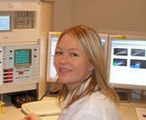Kylie Price

- Position
- Scientist
- Field
- Biochemistry
- Place of Work
- Malaghan Institute of Medical Research
Kylie’s position involves running a $750,000 flow cytometer machine that can sort individual cell types out of mixed populations of cells.
Region
Wellington
Job
The flow cytometer Kylie runs is called the BD FACSVantage DiVa, which works by utilising light beams (lasers) to excite fluorescent dyes attached to specific cell types. This allows the recognition of cells of interest, which are injected into a liquid stream and come out through a nozzle into mid-air. The nozzle vibrates causing the stream to break up into droplets, the droplets that contain the cells of interest are charged and then pass through an electrical field. The drops that have the charge applied to them are deflected into a catcher tube, meaning that Kylie is able to control which cells are to be “picked-out” for purification.
I always enjoyed science at school...
There are very few flow cytometrists in New Zealand, mainly because of the expense of the equipment involved, so Kylie’s skills are in demand. Flow cytometry can be used to identify a particular type of cell, to determine if a cell is alive or dead, as well as get some information on the internal structure and complexity of a cell and the processes (such as communication and replication) that it is doing. This information is useful in studying diseases such as cancer.
Kylie is currently developing this technology to enable her to isolate cancer stem cells out of tumours. Once these cells are purified, researchers will be able to trial new drugs on the cancerous stem cell in an effort to specifically kill these cells without harming normal cells. This could lead to a less invasive, more efficient cancer treatment, targeting tumours at their source without damaging the surrounding tissue.
Career Pathway
Kylie always enjoyed science at school and decided she wanted to be a forensic pathologist. She went to Dunedin to complete her Health Sciences year at Otago University and one of her compulsory papers was Biochemistry. She ended up loving Biochemistry so much she swapped track and completed her BSc majoring in Biochemistry and minoring in Anatomy. Still being interested in Forensics, Kylie decided to complete her MSc in Biochemistry and Molecular Genetics at Victoria University in Wellington. The work for her MSc had the potential to be used as a Forensic technique. Having completed her MSc Kylie decided to get some work experience at New Zealand’s leading biomedical research institute, the Malaghan Institute of Medical Research. She worked within the Institute’s Multiple Sclerosis team and then with the Biodiscoveries team before the opportunity came up to take over the Flow Cytometry facility.
Interests
Travelling, reading books, riding horses, listening to music (especially NZ music), playing pool, going out for dinner, swimming, tennis and rugby.
Metadata
- Published:
- 15 November 2007


